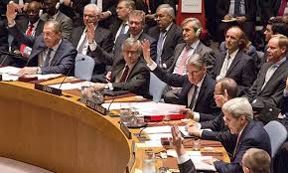 UNITED NATIONS: The UN Security Council unanimously adopted a resolution endorsing a peace process in Syria to end the five-year-long war through talks between the government and the opposition, but the draft is silent on the role of President Bashar Assad in a political transition.
UNITED NATIONS: The UN Security Council unanimously adopted a resolution endorsing a peace process in Syria to end the five-year-long war through talks between the government and the opposition, but the draft is silent on the role of President Bashar Assad in a political transition.
In its first resolution to focus on the politics of ending the brutal war, the 15-nation Council, meeting at the Foreign Minister level here, asked UN chief Ban Ki- moon to convene government and opposition representatives in formal talks next month on a political transition as a step to lasting peace, in line with the 2012 Geneva Communique.
It called for a Syrian-led political process facilitated by the UN to establish within six months “credible, inclusive and non-sectarian governance,” setting a schedule for drafting a new constitution, with free and fair elections to be held within 18 months under UN supervision with all Syrians, including members of the Diaspora, eligible to vote.
It acknowledged the close linkage between a ceasefire and a parallel political process, with the former to come into effect as soon as the sides have begun initial steps towards a political transition under UN auspices.
US Secretary of State John Kerry, sitting as President of the Council, said that through the resolution, the world body is sending a “clear message to all concerned that the time is now to stop the killing in Syria and lay the groundwork for a government that the long-suffering people of that battered land can support.”
He stressed that the US is determined, with its coalition partners, to degrade and defeat the terrorist group ISIS.
“The truth is that nothing would do more to bolster the fight against the terrorists than a broadly supported diplomatic process that gives the Syrian people a real choice not a choice between President Bashar Assad or Daesh, but between war and peace, between the violent extremes and a newly empowered political center,” Kerry said.
“That is why we have joined with so many of you in support of an urgent diplomatic initiative,” he told the UNSC.
“It’s our hope that a nationwide ceasefire can go into effect, excluding only Daesh and al-Nusrah and any other group that we might decide at some time to designate,” he said.
The resolution does not make any mention of whether Assad would be able to run in new elections.
The resolution was adopted unanimously after Ban briefed the UNSC on his meeting earlier in the day with the International Syria Support Group (ISSG), comprised of the Arab League, the European Union, the United Nations, and 17 countries, including the US and Russia, which have been seeking a path forward for several months.
“As the first resolution to focus on the political path to resolving the crisis, this marks a very important step on which we must build,” Ban told the Council. “We see a country in ruins, millions of its people scattered across the world, and a whirlwind of radicalism and sectarianism that challenges regional and global security,” Ban said.
The resolution asked Ban through the offices of his Special Envoy Staffan de Mistura to determine the modalities of a ceasefire and plan to support its implementation, while urging Member States, in particular members of the ISSG, to accelerate all efforts to achieve a ceasefire, including through pressing all relevant parties to adhere to one.
Emphasizing the need for a ceasefire monitoring and verification mechanism, the Council asked the UN Chief to report back to it on options with a month, and called on Member States to provide “expertise and in-kind contributions” to support such a mechanism.
It reiterated previous calls for Member States to suppress terrorist acts by Islamic State, Al-Nusra Front and all others.
The resolution also called on the parties to immediately allow rapid and safe access throughout Syria for immediate humanitarian aid to reach all people in need, and to release arbitrarily detained persons, particularly women and children.
It also demanded that all parties immediately cease attacks against civilians, including medical facilities and personnel and the indiscriminate use of weapons, including shelling and aerial bombardment.
It also stressed on the “critical need to build conditions for the safe and voluntary return of refugees and internally displaced persons to their home areas.”
More than 200,000 people have been killed in the nearly five year long civil war in Syria. The constant violence has forced more than four million to flee the country, fueling a refugee crisis in the Middle East and Europe.–PTI





